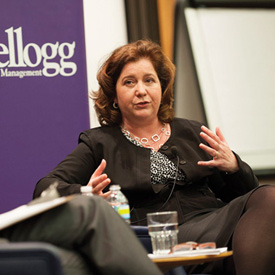Janice Eberly, Phd ’92
As the U.S. Treasury’s chief economist, Janice Eberly is eagerly helping to steer the nation through global economic uncertainty. Her job couldn’t be any more interesting—if she’s lucky.

“For most economists, this period in the United States and in the global economy will hopefully be the most challenging period in our professional careers,” says Eberly, who was named assistant secretary of the Treasury for economic policy in October 2011. “As a set of economic topics, it’s challenging and exciting. However, we would obviously like to reduce the severity of the human cost, and that’s the motivation for working on policy to support the economy.”
Eberly leads the office responsible for analyzing and reporting on U.S. and global economic developments and helping to determine economic policies. She is on leave from Northwestern University’s Kellogg School of Management, where she is a finance professor.
“The opportunity to serve in government and provide public service is a fantastic chance for academics to apply the work that we do,” she says. “It’s an opportunity to get a fresh perspective on what you think you know.”
As an undergraduate at the University of California, Davis, Eberly was drawn to macroeconomics as a window on the underlying causes of complex political and societal issues. As a doctoral candidate at MIT, she honed her understanding of the influence of policy on world economies. She studied with Stanley Fischer, PhD ’69, now head of Israel’s central bank, and her advisor was Olivier Blanchard, PhD ’77, now director of research at the International Monetary Fund.
“They set the tone of being analytically very rigorous and demanding,” says Eberly, who remembers Paul Krugman, PhD ’77, being peppered with questions after presenting a paper on exchange rate ranges authorized by central banks. “When anybody presented their research, whether it was a second- or third-year grad student or a visiting faculty member, everyone was subjected to the same degree of tough questioning and rigorous debate … MIT prepared me well for this. You have to support your position.”
Eberly met her husband, David Dunand, PhD ’91, when he was studying materials science at MIT. Dunand is visiting at the National Institute of Standards and Technology, on leave from Northwestern University, where he is a professor of materials science and engineering. They have two children, Murielle, 13, and Marc, 9.
Keep Reading
Most Popular
Large language models can do jaw-dropping things. But nobody knows exactly why.
And that's a problem. Figuring it out is one of the biggest scientific puzzles of our time and a crucial step towards controlling more powerful future models.
How scientists traced a mysterious covid case back to six toilets
When wastewater surveillance turns into a hunt for a single infected individual, the ethics get tricky.
The problem with plug-in hybrids? Their drivers.
Plug-in hybrids are often sold as a transition to EVs, but new data from Europe shows we’re still underestimating the emissions they produce.
Stay connected
Get the latest updates from
MIT Technology Review
Discover special offers, top stories, upcoming events, and more.